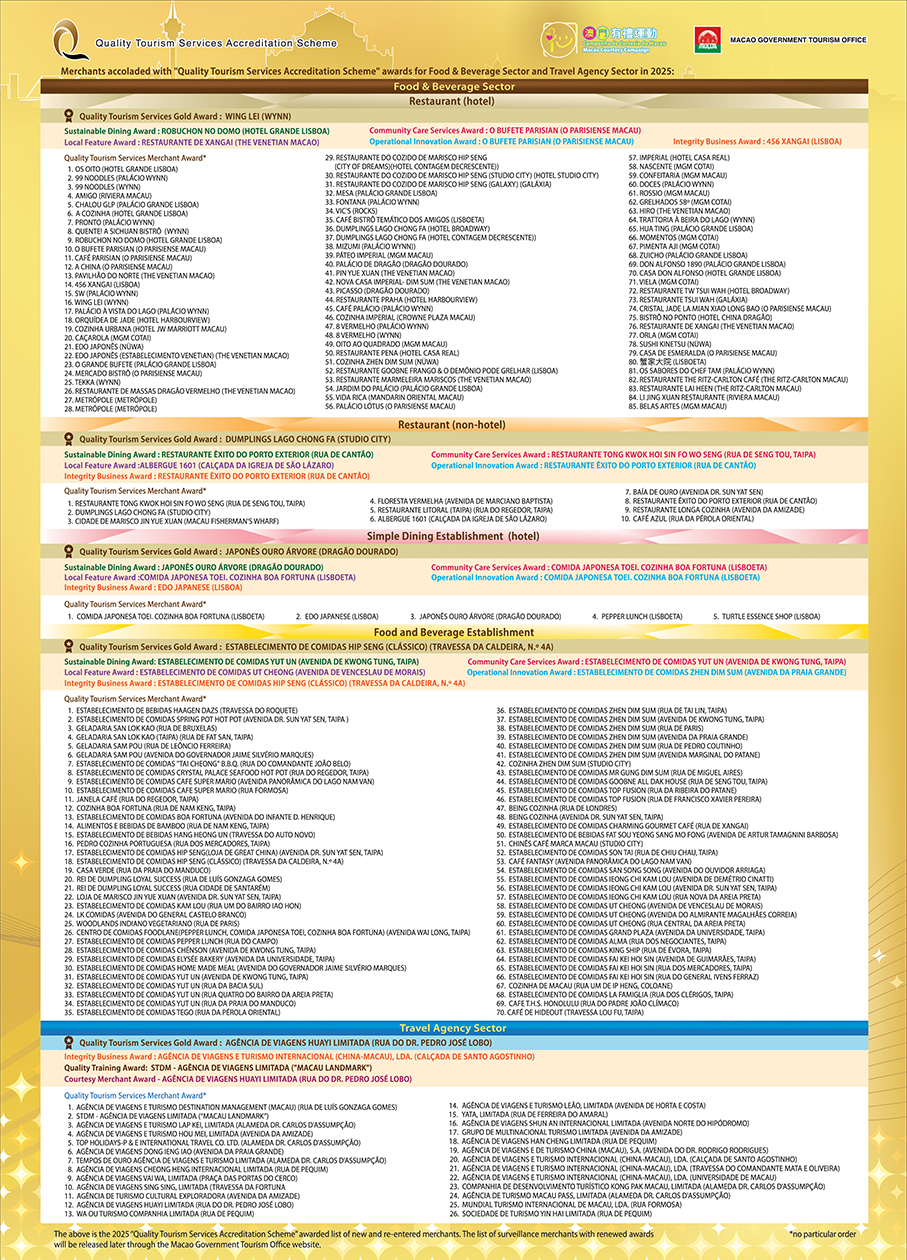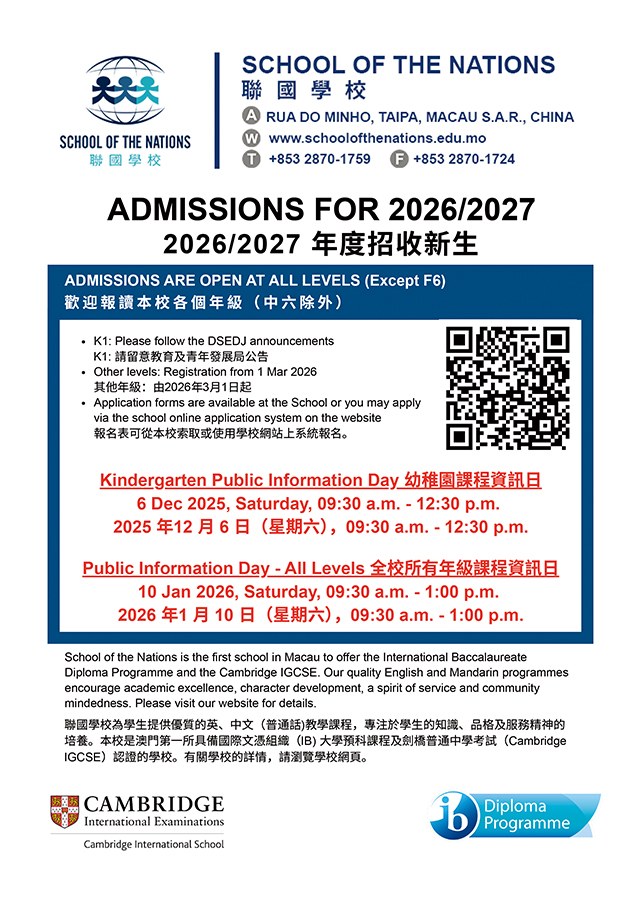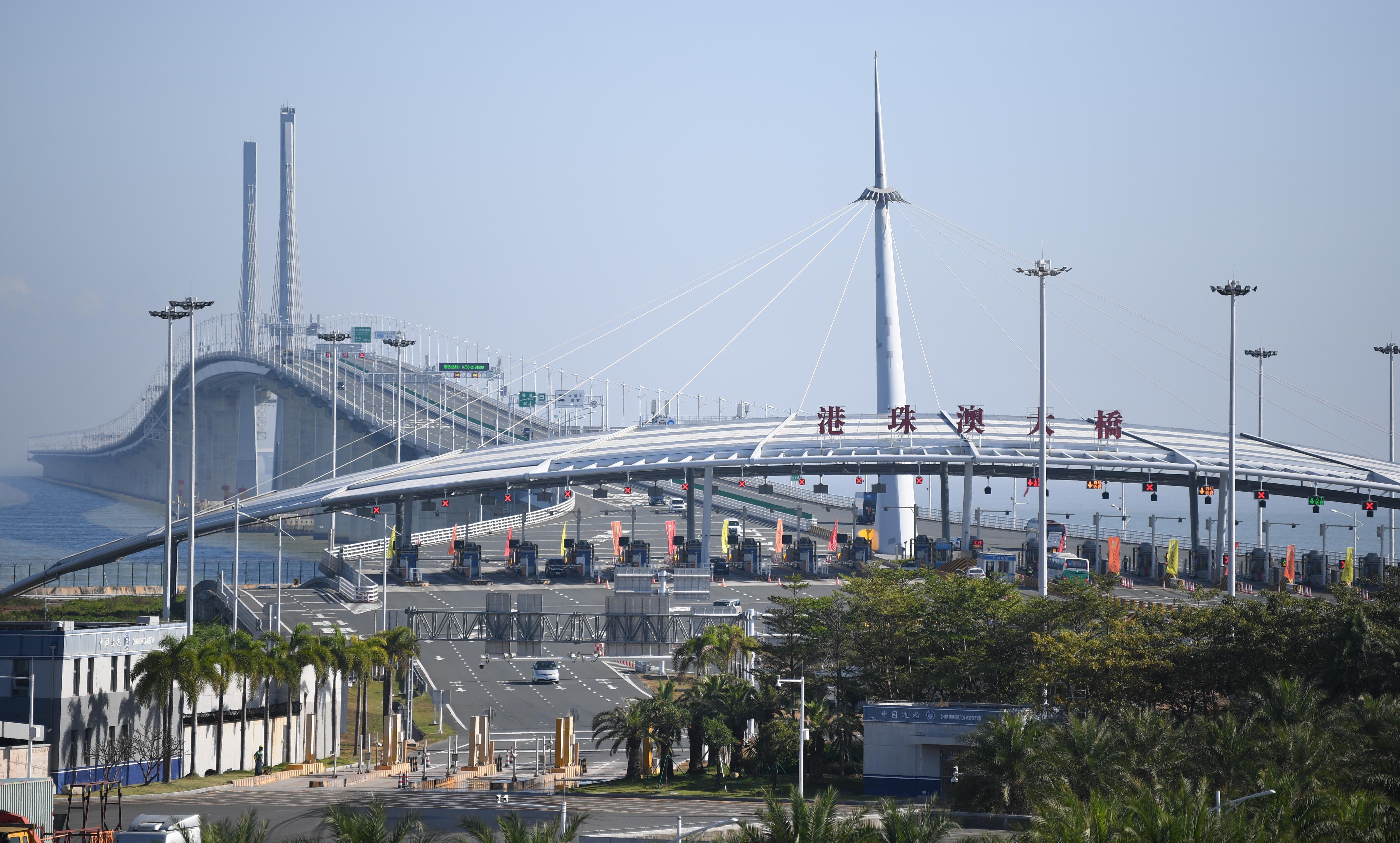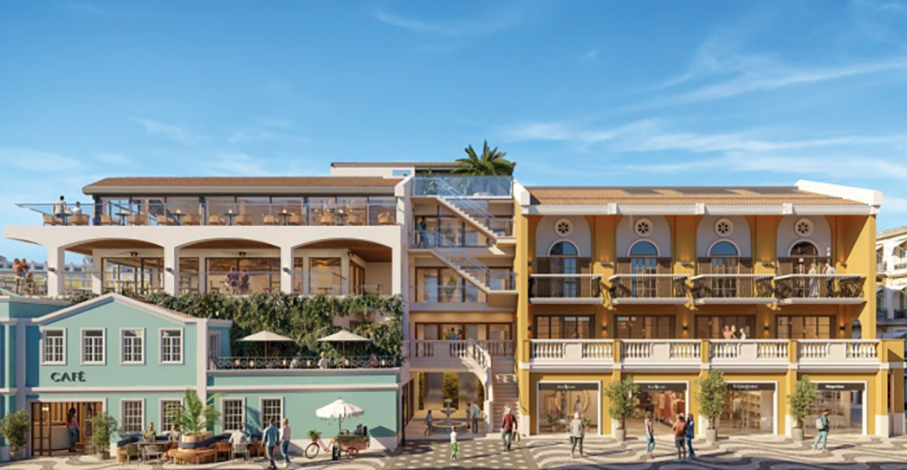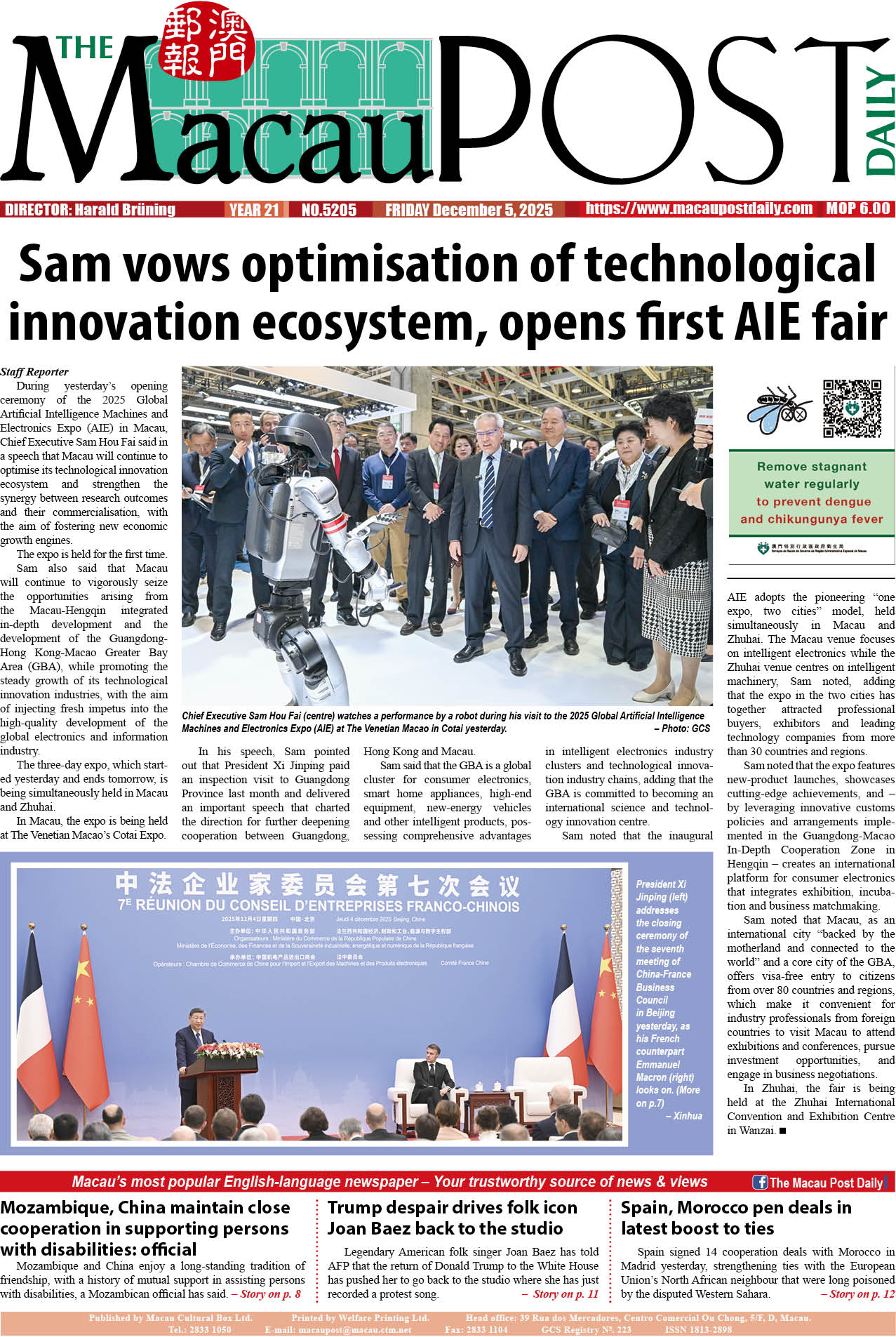Editorial
Chief Executive Ho Iat Seng’s four-day working visit to Portugal, his first overseas trip since he took the helm of the local government in December 2019 just before the COVID-19 pandemic impeded international travel for three long years, has given ties between the two sides a big boost.
Due to my tight work schedule here, I was, much to my own displeasure, unable to cover his trip first hand. The Lisbon Metropolitan Area (AML) has been one of my favourite destinations for over five decades, both for leisure and work, not just the capital city itself but also its outskirts, Sintra in particular. I have had the honour – and pleasure – to interview three Portuguese presidents in Lisbon in the 1990s – Mário Soares, Anibal Cavaco Silva and Jorge Sampaio – about Macau’s then forthcoming reversion to Chinese rule. I cherish fond memories of The City of Light – its nickname is due to the fact that the Tagus River, which acts like a big mirror, reflects an enormous amount of sunlight over the city.
This time I followed Ho’s trip virtually with the help of media reports that I received from Lisbon. I am particularly grateful to my TDM and GCS colleagues. Work well done!
My conclusion is that the trip was even more fruitful than I had expected. Indeed, Ho proved his mettle as chief executive on the international stage.
His courtesy calls on President Marcelo Rebelo de Sousa, who in front of reporters wished him a successful reelection bid next year, and Prime Minister António Costa, as well as his meeting with Foreign Minister João Gomes Cravinho, went very well.
His trip to continental Europe’s most western nation took place at a time when a hot debate is raging between ideologues and realists within the EU and among its 27 member states about their future relationship with China. Based on his idea of pursuing “strategic autonomy” for Europe, a concept that has my full backing, French President Emmanuel Macron said during his recent state visit to China that concerning the Taiwan question Europe should not behave like a US “follower” and avoid the trap of being caught in crises “which are not ours.”
However, in an interview published in a French newspaper yesterday, EU foreign policy chief Josep Borrell called on European navies to patrol the Taiwan Strait. His hawkish remarks should alarm anyone with a reasonable sense of realism in international relations. Instead of threatening to resort to gunboat diplomacy, the EU should actively support the peaceful reunification of China. That would be the best way of promoting world peace.
Brazilian President Luiz Inácio da Silva arrived in Lisbon during Ho’s visit. Brazil is the economically and politically most influential member of the Macau-based Forum for Economic and Trade Cooperation between China and Portuguese-speaking countries (aka Forum Macao). I found it interesting that the head of state and government (Lula is both) of one of the nine Portuguese-speaking countries was visiting Lisbon at the same time as our chief executive. Symbolically, this underlined Macau’s important role as a service platform for relations between China and the Portuguese-speaking world. Lula da Silva just returned from a state visit to China where he and President Xi Jinping concurred on the need to hammer out a peace deal for Ukraine that takes all the sides’ legitimate security interests into account.
Speaking during a wide-ranging press conference on Saturday that wrapped up his visit to Portugal, Ho said he believed that the trip was fruitful as it strengthened exchanges and cooperation between Macau and Portugal in various fields such as trade, scientific and technological innovation, health, culture, and the teaching of the Portuguese language in Macau.
A new chapter
Ho said that the visit opened a new chapter to consolidate and elevate the amicable and cooperative ties between the two sides. Ho said that he purposely chose Portugal as his first overseas destination since becoming the MSAR chief executive over three years ago due to its long ties of amity with Macau and its prominent position in the Portuguese-speaking world.
Ho also underlined that in his meetings with entrepreneurs in Lisbon he promoted the great investment potential in the Guangdong-Macau In-depth Cooperation Zone in Hengqin.
The chief executive also said Forum Macao’s next ministerial conference will be held in Macau in the second half of this year, or in 2024.
Ho also promoted the Belt and Road Initiative (BRI) in his meetings and met with Madrid-based World Tourism Organisation (UNWTO) Secretary-General Zurab Pololikashvili on the sidelines of the Global Tourism Economic Forum (GTEF) in Lisbon. The forum, of which Macau resort executive Pansy Ho Chiu King is vice-chair and secretary-general, will celebrate its 10th anniversary in Macau on September 21, according to a UNWTO announcement.
Ho’s visit also coincided with a Macau tourism promotion organised by the Macau Government Tourism Office (MGTO). I would like to use this opportunity to express by admiration for MGTO Director Maria Helena de Senna Fernandes’s unflagging zeal to promote Macau’s tourism sector, particularly during and after the COVID-19 pandemic. For me, she is a model civil servant. Accompanied by Senna Fernandes, Ho and his entourage paid a visit to the open-air promotion in one of Lisbon’s most prominent squares, Praça do Comércio, last week.
The government is certainly doing its utmost to promote Macau’s tourism sector and investment and trade in the post-COVID-19 period. It is now up to the private sector to take up the mantle.
During Saturday’s press conference, Ho also said that his government would try its best to ensure the relaunch of flights between Macau and Lisbon, possibly involving a Chinese airline, before long. Generally speaking, regular flights between the two cities make perfect sense. Realistically speaking, at least in the medium term the route must prove to be financially viable.
Asked by a reporter about Macau’s future political development, Ho said that “a good system doesn’t need to be changed” and that the current system would remain in place even 50 years after Macau’s return to the motherland in December 1999. He also said that Macau wouldn’t turn into a mainland-like city.
His remarks came in the wake of claims by several Portuguese commentators shortly before his trip that China had breached the Sino-Portuguese Joint Declaration, violated Macau citizens’ fundamental right enshrined in the Basic Law and “practically” done away with the “One Country, Two Systems” principle.
Some facts on the Joint Declaration & Basic Law
Well, there have been misleading comments for years about the Joint Declaration (JD) and the Basic Law (BL), and some commentators – even senior politicians – have even confounded both. I have read quite a few comments of that kind for quite a number of years.
Based on the knowledge obtained from my master’s course in International and Public Affairs at the University of Hong Kong over 20 years ago and my personal experience as a news correspondent who covered both the conception and birth of both documents and their respective implementation, I would like to point out the following:
According to the JD, which both countries signed in Beijing in April 1987, “upon resuming the exercise of sovereignty over Macau”, China was to establish the MSAR on December 20, 1999 – and that’s what happened after a pretty smooth transition period.
The phrase “resumption of the exercise of sovereignty” means that the People’s Republic of China (PRC) always insisted on maintaining its sovereignty over Macau but did not exercise it for a period of time. Portugal claimed sovereignty over Macau until shortly after its anti-colonial Carnation Revolution of April 25, 1974, after which Macau became a territory under temporary Portuguese administration.
Incidentally, Lula da Silva will address Portugal’s parliament, the Assembly of the Republic, tomorrow, the revolution’s anniversary.
The JD’s Article 12 also states that Macau’s future BL would stipulate the “related clarifications set forth in Annex I” and that the basic policies enshrined in the latter would “remain unchanged for 50 years.”
Annex I, defined as the “Elaboration by the Government of the People’s Republic of China of its Basic Policies Regarding Macau”, reaffirms that Macau’s “existing social and economic systems and way of life shall remain unchanged for 50 years.”
The JD is a joint statement by two nations about how they planned to tackle a question left over by history and, most importantly, how to prepare a certain territory’s transition from its temporary administrative power to its reversion to the country that it originally belonged to.
When the transition period ended at midnight on December 19, 1999, Portugal’s formal link with Macau as its temporary administrator came to its carefully-planned end and the JD became an historical document that in March 1988 was deposited with the United Nations – like many other international instruments signed by UN member states, but which does not give them extra legal status.
The BL was promulgated by China’s then president Jiang Zemin in March 1993. Its preamble states that “the socialist system and policies will not be practised in Macau.”
Article 5 of the BL elaborates on that by stating that “the previous capitalist system and way of life shall remain unchanged for 50 years.”
It’s wrong to say that the 50-year period enshrined in the BL shows that Macau is going through a five-decade-long transition period and that the BL would necessarily “expire” after those five decades.
The BL does NOT include any article stating an expiry date, or what one may call informally its “shelf life”.
Article 5 can be amended by the National People’s Congress (NPC) and, according to Article 144, the NPC Standing Committee, State Council and MSAR each have the power to propose amendments to the BL.
I could imagine that Article 5 will be amended in due course before 2049, such as by simply removing the “50 years” and, thereby, leaving the article’s validity open ended.
2049 will be an important year in the history of the PRC as it will mark the centenary of its foundation on October 1 in that year. I am quite sure that the central authorities will continue to treat the MSAR well beyond 2049 – as they have since its foundation in 1999.
Anyhow, I expect Ho’s visits to Luxembourg to study its bond issuing regulatory framework and to Brussels for talks with Belgian and EU officials this week to be productive as well.
Luxembourg and Macau share certain similarities such as that they are multilingual societies with large non-local workforces.
Unlike Hong Kong, Macau and the EU are linked by a trade and cooperation agreement that has been in force since January 1993.
– Harald Brüning


